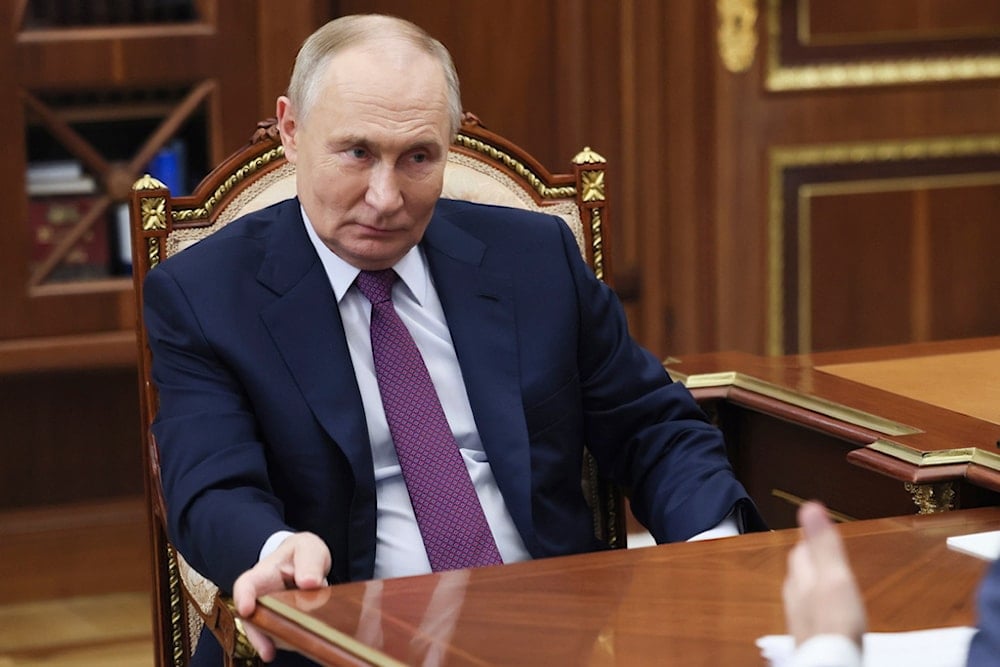Putin open for Ukraine ceasefire talks with Trump: Reuters
The news agency cites sources as saying that demands from the Kremlin could include limiting the size of Ukraine’s military and ensuring protections for Russian language speakers.
-

Russian President Vladimir Putin attends a meeting with the New People party's leader Alexey Nechaev in Moscow, Russia, Tuesday, November 19, 2024. (Sputnik)
Russian President Vladimir Putin is open to negotiating a Ukraine ceasefire deal with US President-elect Donald Trump but has ruled out major territorial concessions while insisting that Kiev abandon its NATO aspirations, Reuters reported Wednesday, citing five sources familiar with Kremlin discussions.
Trump, who has pledged to swiftly resolve the conflict, will return to the White House at a time when Russia holds a position of strength.
Moscow controls a substantial area in the Donbass, approximately the size of the US state of Virginia, and has been advancing at its fastest pace since the early days of the 2022 war, the news agency noted.
What might Russia allegedly agree on?
In the first detailed insights into what Putin might accept in a Trump-brokered peace agreement, the five sources, including current and former Russian officials, indicated that the Kremlin could agree to freeze the conflict along current front lines, the agency claimed.
According to Reuters, there may be room for negotiations over the precise demarcation of the four eastern regions—Donetsk, Luhansk, Zaporizhzhia, and Kherson—which Moscow claims as fully integrated into Russia.
The news agency cited two officials as saying that Russia might consider withdrawing from small portions of territory in the Kharkov and Nikolaev regions north and south of Ukraine.
Putin recently reiterated that any ceasefire must reflect the "realities" on the ground, but expressed concerns that a temporary truce might only enable the West to rearm Ukraine.
"If there is no neutrality, it is difficult to imagine the existence of any good-neighbourly relations between Russia and Ukraine," he stated during the Valdai discussion group on November 7.
"Why? Because this would mean that Ukraine will be constantly used as a tool in the wrong hands and to the detriment of the interests of the Russian Federation."
Two sources pointed out that outgoing US President Joe Biden’s decision to supply Ukraine with long-range ATACMS missiles—recently used by Kiev to strike Russian territory for the first time—could complicate and delay a ceasefire.
Trump’s communications director, Steven Cheung, told Reuters that the president-elect "is the only person who can bring both sides together in order to negotiate peace, and work towards ending the war and stopping the killing."
While Trump has expressed willingness to speak directly with Putin to broker a deal, he has not provided details on how he might reconcile the positions of the two sides, both of which remain entrenched.
Ukrainian President Volodymyr Zelensky has maintained that Ukraine will not rest until all Russian forces are expelled from its internationally recognized territory. However, several top US military officials have acknowledged that achieving this goal would be highly ambitious.
Limiting the size of Ukraine's military
Putin’s conditions for ending the war, outlined on June 14, include Ukraine relinquishing its NATO ambitions and withdrawing its forces from all territories claimed by Russia in the four contested regions.
The five current and former officials said that while Moscow opposes NATO's presence in Ukraine, it is open to discussing alternative security guarantees for Kiev.
Other demands from the Kremlin could include limiting the size of Ukraine’s military and ensuring protections for Russian language speakers, according to the sources.
One senior Kremlin insider remarked that the West must confront the "harsh truth" that its support for Ukraine could not prevent Russia from achieving its war objectives
Sources pointed to a draft agreement from April 2022, negotiated in Istanbul, as a potential framework for a ceasefire.
Under that draft, Ukraine would commit to permanent neutrality in exchange for security guarantees from the five permanent members of the UN Security Council—Russia, the US, China, France, and Britain.
One Russian official stated that no agreement would be reached unless Ukraine received security guarantees, emphasizing, "The question is how to avoid a deal that locks the West into a possible direct confrontation with Russia one day."
Read more: Zelensky warns of defeat if US halts military support to Ukraine

 4 Min Read
4 Min Read









